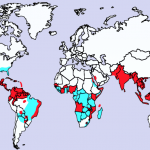 A class of antibodies to make vaccines for dengue has been found, researchers said.
A class of antibodies to make vaccines for dengue has been found, researchers said.
A new class of antibodies that can neutralize all four types of dengue virus produced from mosquito or human cells has now been discovered, as per reports in the journal Nature Immunology. In addition to helping create a new vaccine, this discovery will improve laboratory tests.
Dengue is a highly virulent tropical viral infection that spreads via mosquitoes. Dengue fever has flu-like symptoms and can be life-threatening. It currently does not have any treatments or vaccines. About half a million people are hospitalised with dengue every year and most are children.
Dengue is rampant in tropical countries and threatens to spread into the southern United States, Europe and in Australia.
Infection with one type of dengue vaccinates the body against that particular form, but the person can still acquire the three other forms. The dengue virus has a shell that is completed partly in human cells and partly in mosquito cells.
The scientists who made this discovery, a team of researchers from Australia, Vietnam and London, studied 145 dengue antibodies, which are natural agents developed by organisms that have the dengue virus in their cells (mosquitoes and humans). They found a class of antibodies that can bind to a structure, called an epitope, which is present in all four types of the dengue virus.
Although the right antibody that can fight the dengue virus has been discovered, a vaccine for dengue is still to be developed using this new class of antibodies. It could still take up to 20 years before a cure for the disease is found. The scientists have conducted successful trials in Vietnam, but have still to try the new antibodies in countries like Australia.
Dengue haemorrhagic fever, which develops in some patients who have acquired dengue, kills about 22,000 people a year. Dengue occurs as an epidemic and can paralyse healthcare systems in congested cities where it can cause thousands of hospitalisations at the same time.
Source: International Business Times

















